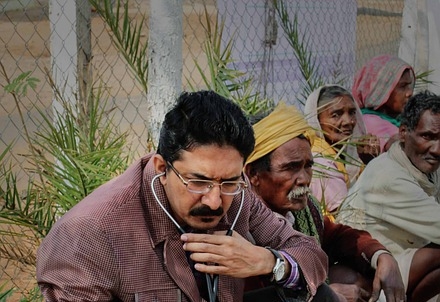The economy is in meltdown mode and our political parties are in election mode. So even as those who cannot take it anymore are opting out of life altogether, old wounds are being opened again to ignite communal passions, resulting in the loss of life and injury to many who want to live. It is a time when it would be easy to panic, about ones personal future and about the future of the country.
Yet, even at times of apparent madness, you hear sane voices that remind you that all is not lost; that there are still institutions that understand the silent emergencies that people face in ostensibly normal times.
A recent ruling by the Bombay High Court can be viewed as one of these positive flickers of hope. Unfortunately, despite the relevance of the judges comments, the case has had little coverage in the media.
Encouraging observations
In a ruling on a case of sexual harassment against a private sector company, the two-judge bench has made observations that would encourage women who face such problems but are afraid to talk about them.
A woman employee of an Indian company filed the case. She says her superior male colleague subjected her to harassment. Initially, she did not complain, as she was afraid of losing her job. But, she alleges, that the officer posted her out to another project site for not cooperating with him. Four years later, when the project failed to take off, all the other women employees were given the option of moving out except her. The harassment also continued.
In 2004, the woman finally complained to the State Womens Commission and also to the District Collector. She also filed an FIR with the local police station. The womens commission sent a notice to the company asking it to inquire into the womans complaint. The company appointed an enquiry officer, an advocate, to look into the complaint. The latter exonerated the officer against whom the complaint had been made. Within a week of his report, the woman was dismissed from service.
Even then she did not give up and went to the Labour Court and complained about unfair dismissal. The Labour Court upheld her appeal and directed the company to reinstate her last year. The company failed to comply with the Labour Courts ruling.
Secondly, the case reminds us of the important role that womens commissions can play in such cases. Women are often afraid to go directly to court. The womens commission is often the first step. If the woman had not gone to the womens commission, perhaps her case would never have reached the court. A woman who suffers sexual harassment is in a very lonely place. She is afraid to speak out for fear of losing her job. And if she does, she faces the additional problem of not being employable as other companies might see her as some kind of trouble-maker. As a result, most women silently bear harassment and sometimes voluntarily opt out of jobs or positions where they are harassed. The silence ensures that more of this kind of harassment continues.
Constitutional basis
However, even one such case breaks through the shroud of silence. The remarks of the two judges, Justice Ranjana Desai and Justice D Y Chandrachud, remind us of the basis on which the law of sexual harassment was formulated. It recognises women as having the same rights to life and liberty as any Indian citizen. And that to discriminate against them just because of their gender is to actually deny them that right. I quote below a part of the ruling in this case:
The right to gender equality is intrinsic to the right to life under Article 21 of the Constitution. The right to life comprehends the right to live with dignity. An affront to or the invasion of gender is destructive of the right of every woman to live with dignity. Article 15 of the Constitution, which contains a prohibition inter alia against discrimination by the State on the ground of sex is an emanation of that right. The provisions of the Constitution recognise gender equality as a fundamental right. Gender equality in all its dimensions is a basic human right which is recognised by and embodied in the provisions of the Constitution. The broad sweep of the human right to gender equality traverses every facet of the position of a woman in society. The right comprehends the preservation of the dignity of women. At a basic level, gender equality postulates protection of women against all those practices which invade upon the dignity of being and the privacy of the person. A dignified existence includes the right to earn ones livelihood in conditions that are fair and gender neutral. A condition which operates to disadvantage a woman worker on the ground of gender is fundamentally anachronistic to the vision of our constitutional order. Gender as a concept has wider dimensions than sex. Gender equality postulates the realisation of societal values that travel beyond a mere notion of sexual equality. Gender in that sense denotes the realisation of every facet of personality that contributes to the fullness of life to which a woman is entitled.
Gender equality traverses every facet of the position of a woman in a society. That is the key sentence. This is what women must hold on to and believe in as they fight for their rights as citizens.
























